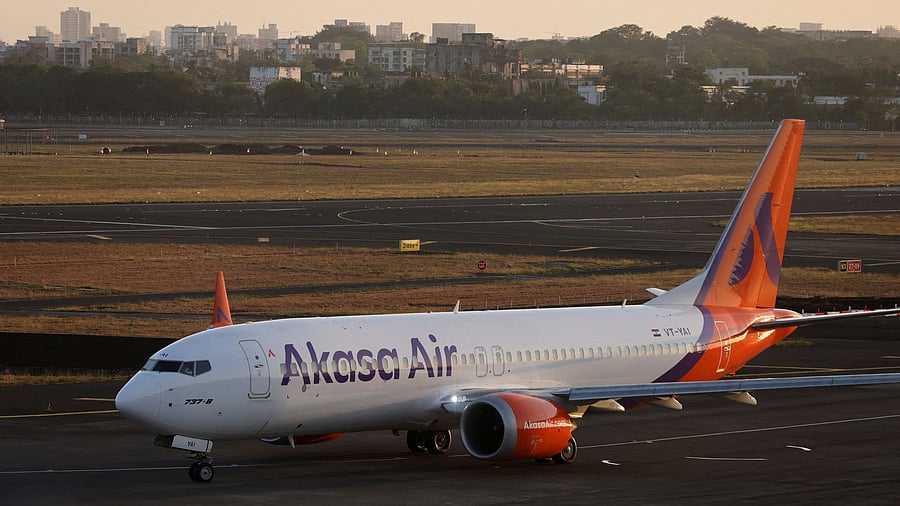
An Akasa Air passenger aircraft on the tarmac at Chhatrapati Shivaji International Airport in Mumbai.
Credit: Reuters Photo
Just as the country started betting on its youngest carrier to keep its domestic skies from duopoly operations, Akasa Air’s public battle with over 40 of its 450 pilots who exited the airline, has robbed the Indian aviation observers of their earlier confidence. Most point out that pilot attrition is a global issue and not a singular Akasa problem. Their worry lies in some of the managerial decisions taken by the airline and its reticence in hiring more pilots in time to keep its operations from being impacted.
Last week, Akasa Air’s chief executive officer, Vinay Dube, rushed to assure employees that the airline is not folding up, propped as it is by a strong financial footing and is instead all set to implement its long-term growth plans. True, the late Rakesh Jhunjhunwala-backed was the fastest to get to a fleet of 20 aircraft - a prerequisite to mount international flights. There is also that “three-digit aircraft order” (not revealing the exact number) that has already been placed.
Yet the airline has stated in court that the abrupt departure of over 40 pilots, without serving their notice period (of six months) had disrupted its flight schedule to the extent that 600 flights had to be cancelled in August and in September, this number could go up to 700, prompting the legal battle it has initiated. In a competitive market, other players such as IndiGo, the Tata-run airlines and even the otherwise beleaguered SpiceJet have swooped in to bite into Akasa’s market share, which slipped from 5.2% in July to 4.2% in September. This, in fact, pushed its ranking below SpiceJet in August.
Most of the pilots have reportedly joined rival Air India Express, which, like Akasa Air, operates the Boeing 737 family of aircraft (Boeing B737NG). The 13-month-old carrier, along with seeking the pilots to serve the full notice period as per their contracts, has also sought Rs 21 crore each in compensation from some of the pilots for loss of operational profits and damage to its reputation.
While the airline is at pains to pin the blame on the pilot exodus, Indian aviation experts question the airline’s managerial competence. “This is a symptom of the airline's mismanagement that started with choosing the B737 Max fleet, which has had several problems in the past and also faces a shortage of experienced pilots. The airline has painted itself into a corner by willingly betting its future on an aircraft which is unstable and which pilots are reluctant to fly,” said Mark Martin, CEO, Martin Consulting.
Others underscore that the paucity of pilots is a global phenomenon. “Every airline is talking of inducting hundreds of aeroplane but no one is talking of how to get the crew to man these aeroplanes,” said Captain Sanjay Karve NM, Retired Accountable Manager and Chief Pilot, Maharashtra Government adding that all airlines will have ‘pilots-in-command’ or captain attrition. He also contended that the flight cancellation numbers projected are more than what is happening on the ground.
India's aviation authorities, on Saturday, ruled out intervening in a dispute between Akasa Air and its pilots, after the budget carrier moved the Delhi High Court seeking enforcement of an existing interim order on a mandatory notice period.
“It is also surprising why Akasa did not hire new pilots when its pilots resigned (6 months ago for second officers and one year ago for commanders). There are ways Akasa can overcome this situation - one is by immediately hiring more pilots at any cost to keep their operations running. The management now has to move really fast,” Martin urged.
Alok Anand, chairman and CEO of Acumen Aviation suggested the airline shouldn't refrain from hiring foreign pilots to deal with the scarcity in the short term.
“Pilot-poaching is a global practice. Today it happened to Akasa and tomorrow it will happen to Air Asia. It is important for the domestic aviation industry to sort the issue out with a set of positive practices, norms and agreements put in place,” suggested Harish Bijoor, Founder, Harish Bijoor Consults Inc. “A no-poach, serving regulation governed contract terms and the positive practice of live and let live needs to fall into place,” he added.
Industry analysts foresee a severe shortage of experienced Indian pilots in the coming years, and smaller players Akasa Air could be relatively more vulnerable than large airline groups.
“Indian pilots want to fly long-haul and a shift to Tata-operated Air India would enable faster growth,” reasoned Rishi Jain, CEO of Jain Aviation Consultants. “Pilot attrition is a teething issue for Akasa, and adding widebody aircraft to its fleet is one way to get more Indian pilots currently operating in the Middle East and Gulf markets to fly with them,” he suggested.
“For Akasa, even this shall pass. The important thing is to learn from it all and get an airline insulated. None of the back-end issues must spill over and touch the front end of flyers,” Bijoor insisted.